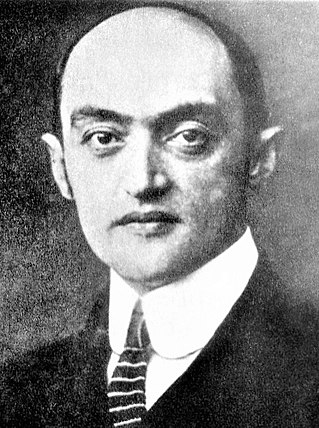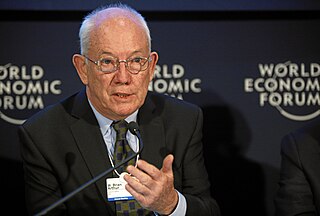Related Research Articles

Joseph Alois Schumpeter was an Austrian political economist. He served briefly as Finance Minister of Austria in 1919. In 1932, he emigrated to the United States to become a professor at Harvard University, where he remained until the end of his career, and in 1939 obtained American citizenship.

The Max Planck Society for the Advancement of Science is a formally independent non-governmental and non-profit association of German research institutes. Founded in 1911 as the Kaiser Wilhelm Society, it was renamed to the Max Planck Society in 1948 in honor of its former president, theoretical physicist Max Planck. The society is funded by the federal and state governments of Germany.
The University of Heidelberg's Heidelberg Center for American Studies (HCA) is a higher education and research center. It was founded in 2004, making it the newest institute of Germany's oldest university. The Heidelberg Center for American Studies opened its first office in the spring of 2003. By October 2004, HCA was officially inaugurated. In the summer of 2006 the HCA moved into its present offices located in a historic building in the old city center of Heidelberg- Curt und Heidemarie Engelhorn Palais, Hauptstraße 120, 69117 Heidelberg. The institute is funded through public and private financial partnership. The founding director and former director of the institute is Prof. Dr. Dr. h.c. Detlef Junker. In February 2018, Prof. Dr. Welf Werner became the second director of the HCA and was also appointed Professor of American Studies at the Faculty of Economics and Social Sciences HCA makes exceptional contribution to interdisciplinary academic and cultural expertise on the United States in Europe. Through public lectures, debates, exhibitions, and panel discussions, the institute educates and provides the public with credible insight on the United States as a nation, and an important transatlantic partner. The Center facilitates discussions between academia and the public, creates and strengthens transatlantic networks. The HCA offers B.A., M.A., and Ph.D. programs in American studies. Students are competitively selected, receive first class education and are mentored by highly qualified professors/scholars.
David Bruce Audretsch is an American economist. He is a distinguished professor at the School of Public and Environmental Affairs (SPEA) at Indiana University and also serves as director of the SPEA International Office, Ameritech Chair of Economic Development, and director of SPEA's Institute for Development Strategies (IDS). He is co-founder and co-editor of Small Business Economics: An Entrepreneurship Journal, and also works as a consultant to the United Nations, the World Bank, the OECD, the EU Commission, and the U.S. Department of State. He was the director of the Entrepreneurship, Growth and Public Policy Group at the Max Planck Institute of Economics in Germany from 2003 to 2009. Since 2020, he also serves as a distinguished professor in the Department of Innovation Management and Entrepreneurship at the University of Klagenfurt.

William Brian Arthur is a Belfast-born economist credited with developing the modern approach to increasing returns. He has lived and worked in Northern California for many years. He is an authority on economics in relation to complexity theory, technology and financial markets. He has been on the external faculty at the Santa Fe Institute, and a Visiting Researcher at the Intelligent Systems Lab at PARC. He is credited with the invention of the El Farol Bar problem.
Frederic Michael Scherer is an American economist and expert on industrial organization. Since 2006, he continues as a professor of economics at the JFK School of Government at Harvard University.
Wolfgang Friedrich Stolper was an American economist.
Entrepreneurship is the creation or extraction of economic value in ways that generally entail beyond the minimal amount of risk, and potentially involving values besides simply economic ones.

Capitalism, Socialism, and Democracy is a book on economics, sociology, and history by Joseph Schumpeter, arguably his most famous, controversial, and important work. It's also one of the most famous, controversial, and important books on social theory, social sciences, and economics—in which Schumpeter deals with capitalism, socialism, and creative destruction.
Innovation management is a combination of the management of innovation processes, and change management. It refers to product, business process, marketing and organizational innovation. Innovation management is the subject of ISO 56000 series standards being developed by ISO TC 279.
The Other Canon Foundation is a center and network for research of heterodox economics founded by Erik Reinert. The name refers to the founders' message of there being another economic canon, alternative to the ruling neoclassical economics. Their suggestions, they claim, are valid for and can be applicated in the first, second and third world.
Economists for Peace and Security (EPS) is a New York–based, United Nations accredited and registered global organization and network of thought-leading economists, political scientists, and security experts founded in 1989 that promotes non-military solutions to world challenges, and more broadly, works towards freedom from fear and freedom from want for all.
Uwe Cantner is a German economist.
Alexander Ebner is a German social scientist and Professor of Social Economics, esp. Economic Sociology and Political Economy at the Goethe University Frankfurt. His main research fields are Entrepreneurship and Innovation, Governance and Public Policy, Regional Development, and the History of Economics.
Ulrich Braukmann is a German professor at the Schumpeter School of Business and Economics of the Bergische Universität Wuppertal. At the Schumpeter School, he is the head of the Institut für Gründungs- und Innovationsforschung and at the same time the chair holder of the Faculty of Educational Theory of Economics, Gründungspädagogik und Gründungsdidaktik.

Steven Irwin Klepper was an American economics professor, researcher and author. Klepper was the Arthur Arton Hamerschlag Professor of Economics and Social Science at Carnegie Mellon University (CMU) in Pittsburgh, Pennsylvania. He was recognized for his teaching and research related to the integration of traditional economic models with evolutionary theory, and finding connections between the study of entrepreneurship and mainstream economics. In 2011, he was the recipient of the Global Award for Entrepreneurship Research. Klepper authored more than 100 peer reviewed articles generating more than 10,000 citations. He is listed in the top five percent of most influential economist authors in the world according to IDEAS/RePEc.
Christine Katharina Volkmann is a German Economist and holds the UNESCO Chair in Entrepreneurship and Intercultural Management at the Schumpeter School of Business and Economics of the University of Wuppertal.

Marcel Alfons Gilbert van Meerhaeghe was a Belgian economist, professor, publicist and columnist.
The Research Center in Entrepreneurial History was a research center at Harvard University founded in 1948 with a grant from the Rockefeller Foundation. Led by the American economic historian Arthur H. Cole, the research center attracted numerous scholars, with varied backgrounds and religious beliefs, in the field of business and economic history such as Joseph Schumpeter, Fritz Redlich, and Thomas C. Cochran. The center issued the first academic journal devoted to entrepreneurship named Explorations in Entrepreneurial History. During the time of its existence, the center attracted rising academic stars such as Alfred D. Chandler Jr., who would later become one of the seminal figures in the field of business history. Intellectually, the research center was influenced by the German Historical School and focused on the role of the entrepreneur in the economy. However, historical research on entrepreneurship ran into methodological roadblocks and the research interest moved towards industrial corporations and neoclassical economics. Today, the research center is seen as one of the first modern attempts to research entrepreneurship and understand the impact of entrepreneurial activities on the economy. While historical research on entrepreneurship has not found much resonance in scientific and public debates, recent decades have seen a revival of the theories of Joseph Schumpeter and more recently calls for a revival of research on entrepreneurial history.
Hiroshi Shimizu is a Japanese management scholar, specializing in innovation and entreprenuership research. He is currently a professor at the School of Commerce, Waseda University.
References
- ↑ "General information". www.issevec.uni-jena.de. Retrieved 23 February 2019.
- 1 2 "Aims of the International Schumpeter Society". www.issevec.uni-jena.de. Retrieved 23 February 2019.
- 1 2 "The Schumpeter Prize 2012 Goes to Franco Malerba and Luigi Orsenigo". www.knowledge.unibocconi.eu. Retrieved 23 February 2019.
- ↑ International Joseph A. Schumpeter Society, history Archived 2009-06-09 at the Wayback Machine , accessed 20 August 2009
- ↑ "Organization". www.issevec.uni-jena.de. Retrieved 23 February 2019.
- ↑ "Schumpeter prize". www.issevec.uni-jena.de. Retrieved 23 February 2019.